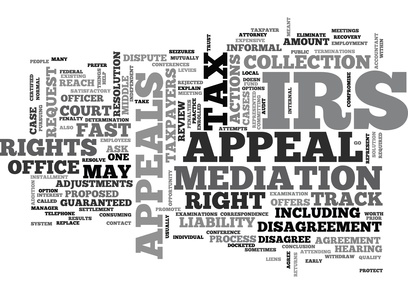
If the IRS ever makes an amendment to your tax return that you do not agree with, you have the right to appeal against the decision. The IRS Office of Appeals offers a way to resolve disagreements with the IRS that relate to your financial assessments. Taxpayers are entitled to get a written response within a certain period of time after they have appealed against an IRS decision, including penalties. If you are wrongly penalized by the IRS, this blog post is for you. Read on as we cover all the details of the process of appealing against the IRS.
Types of IRS Appeals
Two of the most common types of IRS tax appeals is :
- Request for a Collection Due Process :Filing an appeal once the IRS issues a final notice of intent to levy for the client comes under this category. The notice is generally delivered via certified mail.
- Rejected Offer in Compromise : A final opportunity within administrative process to negotiate the submitted Offer In Compromise. A blank Form 12203 typically arrives in the mail along with the Rejected Offer.
IRS Tax Appeal Process
Drafting a Written Protest
First, you need to prepare a formal written application to exercise your right to appeal. The document needed are personal contact information, an affirmative statement that you are requesting your right to an appeal, a copy of the notification, the relevant tax years and statements of law and fact that support your tax return position.
Filing a Lawsuit
If the appeals officer agrees with the IRS, you have the option of challenging the IRS in court. You can pay the amount of tax in dispute and file the appropriate documentation in a U.S. court for a refund, if you choose to pursue the issue in court. You can hire The Law Offices of Nick Nemeth as your professional tax attorney, who can handle the entire process on your behalf.
Tips & Forms Against the IRS
If your application gets rejected, the IRS will have the right to start collecting tax debt from you; although, you can challenge the methods the IRS uses for collection. The IRS needs to provide you an advance notice before it enforces a levy or a lien. You have the right to appeal, if it fails to give you notice or violates other laws and procedures. However, this will only delay the IRS from collecting tax from you, but at the end you have to pay your taxes.
Looking for a Tax Attorney? Contact Us !
Final notices require immediate attention and it is inadvisable for a taxpayer to contact the IRS on their own. Your entire financial future could be compromised if IRS issues are not handled appropriately. If you are facing any such issues, speak with the tax attorneys at the Law Offices of Nick Nemeth. Our IRS tax lawyers have extensive experience in addressing IRS tax problems, including filing and seeing through IRS tax appeals. For a no-obligation consultation, simply call (972) 426-2553 or fill out our contact form.

